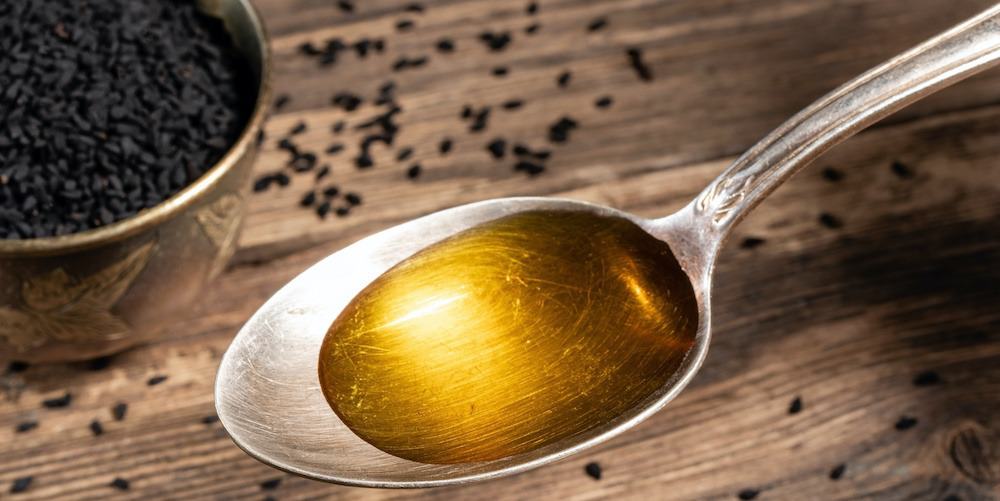BENEFITS OF NIGELLA
✓ Protects and stimulates the body
✓ Reduces inflammation
✓ Fights bacteria
✓ Helps with diabetes
✓ Relieves skin conditions
What is nigella?
Native to southwestern Asia, nigella (Nigella sativa) is a plant belonging to the Ranunculaceae family, like anemones or clematis. Here we refer to Nigella sativa and not to Nigella damascena, or damask nigella, an ornamental plant whose seeds are toxic.
La nigelle tire son nom du latin « nigellus » ou « niger » signifiant « noir » en référence à la couleur de ses graines. Une fois les fleurs fanées, la Nigella sativa produit une multitude de graines comestibles couramment utilisées comme épice, ce qui lui a valu le surnom de « cumin noir ».
The seeds have a pungent, peppery flavor. They are typical of Middle Eastern cuisine and are also used in the preparation of naan, the famous traditional Indian bread.
But nigella seeds are not only valued for their taste. For centuries, they have also been consumed for their therapeutic properties.
The use of nigella as a medicinal plant dates back 2000 years, first in Asia and then in Europe, Africa and India. Today, it is mainly cultivated in the Middle East, Africa and Asia. Producing countries are trying to meet the growing demand for nigella seeds.
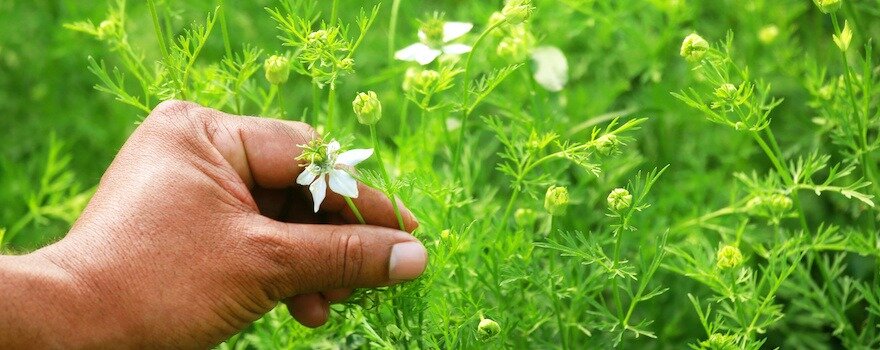
Studies and scientific research have shown that nigella has multiple benefits for health.
By acting beneficially on immunity and fighting free radicals, it protects the body and prevents many diseases and infections.
But it is also anti-inflammatory, antibacterial, helps improve diabetes, and relieves skin conditions.
Nutritional composition
- Acides aminés
- Vitamines : provitamine A, B1, B2, B3, B6, B9, C, E
- Minéraux et oligo-éléments : potassium, calcium, phosphore, magnésium, sodium, fer, cuivre, sélénium, zinc
- Protéines
- Lipides
- Glucides
- Fibres
- Actifs : thymoquinone, thymohydroquinone, dithymoquinone, thymol, nigellone
- Alcaloïdes
- Saponines
- Acides gras : oméga-6-9
- Tanins
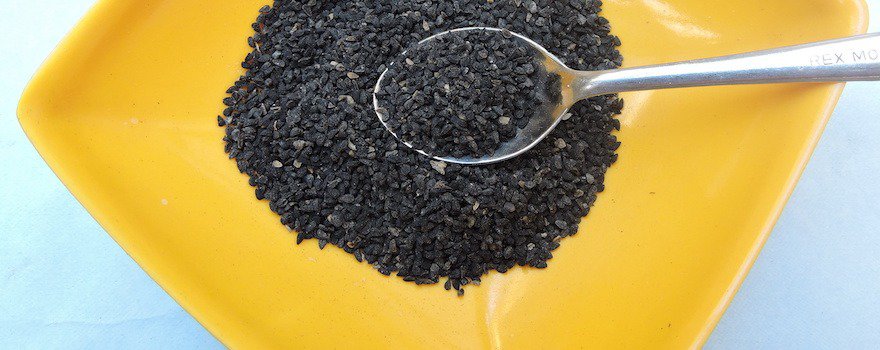
Benefits of nigella
🛡 Protects and stimulates the body
Nigella is a strong protector of the body. On the one hand, it stimulates the immune system and boosts the production of natural defenses; on the other hand, it is antioxidant and fights free radicals that weaken the body.
Consuming nigella seeds is useful to prevent many diseases and infections : flu, pharyngitis, bronchitis, allergies… For this, it stimulates immune defenses such as T lymphocytes. It also boosts the activity of natural killer (NK) cells that help control bacterial infections and destroy cancer cells.
Nigella is also effective at regulating the body’s reactions in cases of immune disorders: vitiligo, allergic rhinitis, asthma, celiac disease…
Finally, it is an antioxidant plant : it fights free radicals that damage cells, accelerate aging and promote the onset of diseases.
These various properties are due to a powerful active compound contained in nigella : thymoquinone. This compound exerts immunomodulatory and antioxidant effects and is capable of protecting the body’s various organs. It traps free radicals while preserving the activity of various antioxidant enzymes such as catalase and glutathione peroxidase.
This review from the American University of Sharjah (United Arab Emirates) presents the immunomodulatory action of nigella.
Another review by Naturoveda India examined the beneficial effects of nigella on immune disorders.
🌵 Reduces inflammation
Nigella has strong therapeutic potential in the treatment of various inflammatory diseases. Thus, it has been shown to be effective at reducing inflammation in cases of periodontitis (inflammation of the tissue surrounding the teeth), rheumatoid arthritis, osteoporosis, osteoarthritis or Alzheimer’s disease, which is characterized by inflammation in the brain.
Again, it is thymoquinone that is responsible for these effects. On the one hand, it inhibits the action of interleukin 1 (IL-1) and interleukin-6 (IL-6), the main pro-inflammatory cytokines of the body. In addition, it acts on the nuclear transcription factor κB (NF-κB) involved in the inflammatory response. Finally, thymoquinone reduces the synthesis of prostaglandins and leukotrienes, the main mediators of inflammation.
Nigella also has analgesic effects. It thus helps relieve acute or chronic pain associated with inflammation, such as joint pain.
This study from the Isfahan University of Medical Sciences (Iran), conducted on mice, shows the analgesic and anti-inflammatory effects of nigella seeds.
This other study from Future University (Egypt), conducted on rats, shows how thymoquinone reduces brain inflammation involved in Alzheimer’s disease.
Finally, this study from the University of Health Sciences (Pakistan), conducted on rats, shows the effectiveness of thymoquinone in alleviating rheumatoid arthritis through its anti-inflammatory action.
🦠 Fights bacteria
Nigella exhibits exceptional antibacterial activity. Various studies on the subject show that it can act on different genera of bacteria : Bacillus, Listeria, Staphylococcus, Escherichia, and Salmonella.
The thymoquinone it contains exerts a bactericidal action : it is capable of inhibiting the growth and proliferation of bacteria. It also prevents the formation of biofilm, a community of microbes and bacteria that covers the mucosal walls.
This review from Mekelle University (Ethiopia) presents, among other things, the antibacterial activity of nigella.
This study from the University of Health Sciences (Pakistan), conducted on bacterial strains, shows the effectiveness of black seed in destroying the bacterium Staphylococcus aureus.
Finally, this study from Kagawa University (Japan), conducted directly on bacterial cultures, shows how thymoquinone prevents the formation of bacterial biofilm.
🍭 Helps with diabetes
In the context of type 2 diabetes, black seed may help lower blood sugar (glycemia) and reduce insulin resistance.
To do this, black seed employs various antidiabetic mechanisms. It increases endogenous antioxidants (produced naturally by the body), fights the overproduction of free radicals, and reduces the inflammation that typically accompanies diabetes.
It also improves the lipid profile of people with diabetes by increasing HDL cholesterol (or “good cholesterol”) while reducing LDL cholesterol (or “bad cholesterol”) as well as body weight. Consequently, it protects them from certain complications such as atherosclerosis and cardiovascular disorders.
This study from the University of Dammam (Saudi Arabia), conducted in patients with type 2 diabetes, shows how black seed improves their lipid profile.
This other study from the Indian Institute of Medical Sciences (India), carried out in patients with insulin resistance syndrome, shows the beneficial effects of black seed (nigella).
🍑 Relieves skin conditions
Because of its anti-inflammatory, antibacterial and antifungal actions and its richness in omega-6 and omega-9 fatty acids, black seed (nigella) is useful for treating certain skin conditions such as eczema, psoriasis and acne.
In cases of common acne, black seed (nigella) notably helps significantly reduce papules and pustules. It also causes pigmentation and darkening of the skin in cases of vitiligo and limits the proliferation of psoriatic plaques, all without causing any side effects. Finally, it promotes and accelerates wound healing.
This plant also contributes to the beauty and health of the skin by relieving irritation, improving hydration and strengthening the protective barrier. That is why it is increasingly used in anti-aging, moisturizing, soothing and protective cosmetics.
This review from the University of Dammam (Saudi Arabia) presents the dermatological effects of black seed (nigella).
This other study from Bu-Ali Sina University (Iran), conducted on rats, shows how black seed (nigella) promotes wound healing.
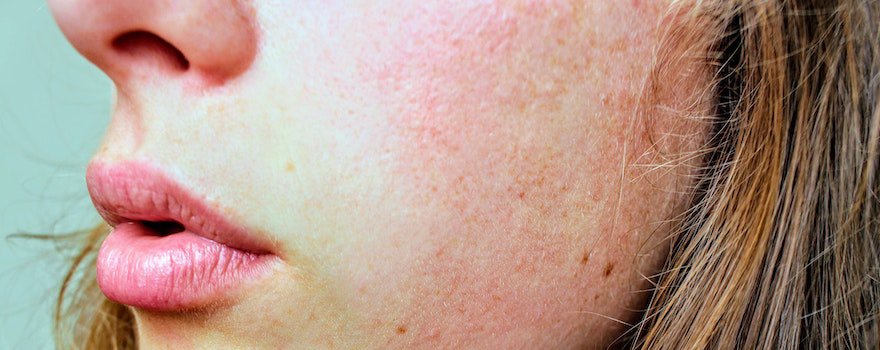
How to consume nigella?
Nigella seeds
Nigella seeds can be added whole or ground to savory and sweet recipes: raw vegetables, fruit salads, meat, fish or vegetable dishes, breads and pastries… They will add depth and a unique flavor to your dishes — peppery, lemony and slightly bitter. Nigella seeds can readily replace pepper in cooking and are easy to digest.
To preserve their benefits, make sure to add them only at the end of cooking. Be mindful of their pronounced taste!
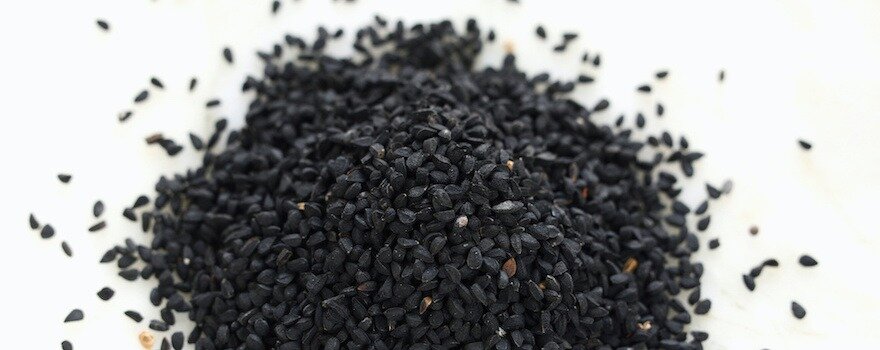
Nigella tablets
Nigella is generally sold in capsules or softgels. Capsules contain powdered nigella seeds. Softgels, meanwhile, contain nigella seed oil. Indeed, like flax, chia, pumpkin or hemp seeds, black cumin seeds are oilseeds: rich in fats, they are ground and pressed to extract an oil that is then encapsulated.
To achieve good results, choose capsules or softgels with a sufficient dose of nigella (at least 500 mg per capsule), preferably additive-free and plant-based.
Nigella powder
Nigella powder is obtained by grinding the seeds. It can be used in cooking or prepared as an herbal tea or infusion. Use 1 teaspoon of powder per cup of hot water. Sweeten with a little honey or lucuma powder.
You can also add nigella powder to your cosmetics, facial and hair masks.
Choose a 100% pure powder, without additives, preservatives or GMOs.
Nigella oil
Nigella oil is used topically as a cosmetic oil for massages and skin care. It helps treat skin conditions and soothe burns, sunburns, irritations and itching. It is particularly suitable for dry, sensitive and irritated skin.
You can apply it directly to the skin or add a few drops to your homemade cosmetic recipes or daily care. First, perform a patch test in the crook of the elbow because nigella oil is rich in essential oil. Also be careful not to apply it to mucous membranes or around the eyes.
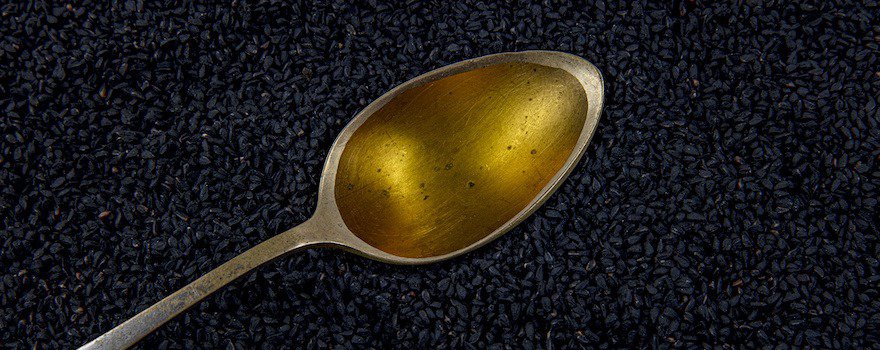
Nigella and medicinal plants
To reduce inflammation, it can be combined with other natural anti-inflammatories such as turmeric, ginger or boswellia.
For skin problems, nigella vegetable oil pairs well with aloe vera, fenugreek oil or rosehip which protect and enhance the skin’s beauty.
Sustainable consumption: favor organic and fair-trade nigella
✓ Today, nigella is mainly cultivated in Africa, Turkey, Syria and India. Ethiopia is a country recognized and renowned for the quality of its nigella seeds. This production provides additional income to local producers and contributes to the development of agricultural regions.
✓ Preferably choose seeds grown organically and sourced from fair trade.
Dosage
Even though there is no real recommended dosage for nigella, it should not be consumed in excessive amounts because it can be slightly toxic (but only at very high doses of 25 g or more).
Capsules or pills are preferably taken in the morning on an empty stomach, in the evening before bed, and 30 minutes before meals.
Ideally, follow treatment courses of 1 to 3 months.
🥄 Seeds : 500 mg per day
💊 Tablets : 2 per day when using 500 mg tablets or capsules.
🥄 Powder : 1 teaspoon in the morning and evening
🥃 Oil: 1 to 2 topical applications per day
Contraindications and side effects
There are certain contraindications to consuming nigella:
- Par mesure de précaution, on la déconseille aux femmes enceintes et allaitantes et aux jeunes enfants ;
- Les personnes souffrant d’un trouble de la coagulation ou devant subir une intervention chirurgicale doivent éviter d’en consommer ;
- En raison de son action sur la tension artérielle, elleest déconseillée aux personnes souffrant d’hypotension.
Nigella consumption causes very few adverse effects. However, the following side effects may occur:
- Maux d’estomac
- Vomissements
- Constipation
If you experience side effects, stop taking it and consult a doctor.
History, cultivation, and market of nigella
Nigella has a rich historical background. Used as a spice in various culinary preparations, it was also a traditional remedy in Arab countries, the Far East, Europe and Africa. Long considered a “miraculous” plant, it was used to relieve many ailments : fever, cough, bronchitis, asthma, headaches and migraines, gastrointestinal disorders…
It is also a flagship plant of prophetic medicine (as dictated by Muhammad) in which it is considered ‘ a remedy for all diseases except death ‘.
Currently, more than 1,000 studies have been conducted over the past 5 decades to uncover the properties of nigella. But it hasn’t finished surprising us! New research highlights the potential of nigella seeds and thymoquinone in the fight against cancer.
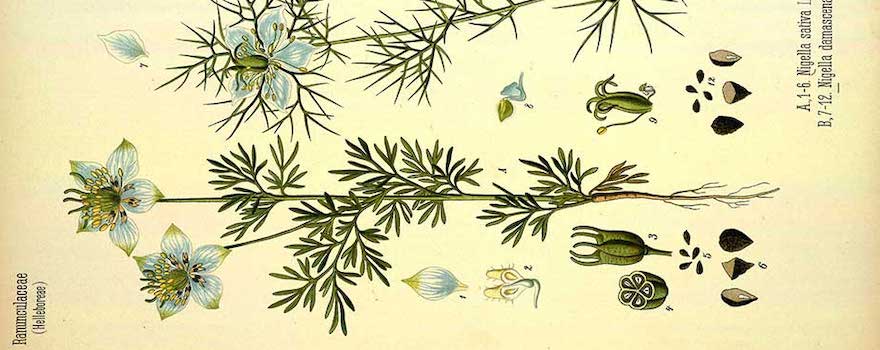
Report by Julia Perez and Charlotte Jean
Sources and scientific studies
Elham Nourbar, Naser Mirazi, Siamak Yari, Mahmoud Rafieian-Kopaei, and Hamid Nasri, 2019. Effect of Hydroethanolic Extract of Nigella sativa L. on Skin Wound Healing Process in Diabetic Male Rats.
Amin F Majdalawieh, Muneera W Fayyad, 2015. Immunomodulatory and anti-inflammatory action of Nigella sativa and thymoquinone: A comprehensive review.
Aftab Alam Hossain, Naturoveda India Pvt. Ltd. Kolkata, Khalid Md Saifullah, 2019. The Effects of Nigella Sativa on the Immune Disorders.
Alireza Ghannadi, Valiollah Hajhashemi, Hadi Jafarabadi, 2005. An investigation of the analgesic and anti-inflammatory effects of Nigella sativa seed polyphenols.
Y S Abulfadl, N N El-Maraghy, Aa Eissa Ahmed, S Nofal, Y Abdel-Mottaleb, O A Badary, 2018. Thymoquinone alleviates the experimentally induced Alzheimer’s disease inflammation by modulation of TLRs signaling.
Sabeen Arjumand, Muhammad Shahzad, Arham Shabbir, Muhammad Zubair Yousaf, 2019. Thymoquinone attenuates rheumatoid arthritis by downregulating TLR2, TLR4, TNF-α, IL-1, and NFκB expression levels.
Ebrahim M. Yimer, Kald Beshir Tuem, Aman Karim, Najeeb Ur-Rehman, and Farooq Anwar, 2019. Nigella sativa L. (Black Cumin): A Promising Natural Remedy for Wide Range of Illnesses.
Abdul Hannan, Sidrah Saleem, Saadia Chaudhary, Muhammad Barkaat, Muhammad Usman Arshad, 2008. Antibacterial activity of Nigella sativa against clinical isolates of methicillin resistant Staphylococcus aureus.
Ayano Tada, Haruyuki Nakayama-Imaohji, Hisashi Yamasaki, Miad Elahi, Tamiko Nagao, Hirofumi Yagi, Masao Ishikawa, Koji Shibuya, Tomomi Kuwahara, 2020. Effect of thymoquinone on Fusobacterium nucleatum‑associated biofilm and inflammation.
Huda Kaatabi, Abdullah O Bamosa, Fatma M Lebda, Abdulmohsen H Al Elq, Ali I Al-Sultan, 2012. Favorable impact of Nigella sativa seeds on lipid profile in type 2 diabetic patients.
Ahmad Najmi, Mohammad Nasiruddin, Rahat Ali Khan, Shahzad F Haque, 2008. Effect of Nigella sativa oil on various clinical and biochemical parameters of insulin resistance syndrome.
Salih H.M.Aljabre, Omar M.Alakloby, Mohammad A.Randhawab, 2015. Dermatological effects of Nigella sativa.
Elham Nourbar, Naser Mirazi, Siamak Yari, Mahmoud Rafieian-Kopaei, and Hamid Nasri, 2019. Effect of Hydroethanolic Extract of Nigella sativa L. on Skin Wound Healing Process in Diabetic Male Rats.
Mohammad Tariq, 2008. Sativa Seeds: Folklore Treatment in Modern Day Medicine.
Hira Ijaz, Ume Ruqia Tulain, Junaid Qureshi, Zeeshan Danish, Samina Musayab, Muhammad Furqan Akhtar, Ammara Saleem, Khanzada Khanzada Khan, Muhammad Zaman, Imran Waheed, Imran Khan, Mohamed Abdel-Daim, 2017. Review: Nigella sativa (Prophetic Medicine): A Review.
Hamid Mollazadeh, Amir R Afshari, Hossein Hosseinzadeh, 2017. Review on the Potential Therapeutic Roles of Nigella sativa in the Treatment of Patients with Cancer: Involvement of Apoptosis: – Black cumin and cancer.


